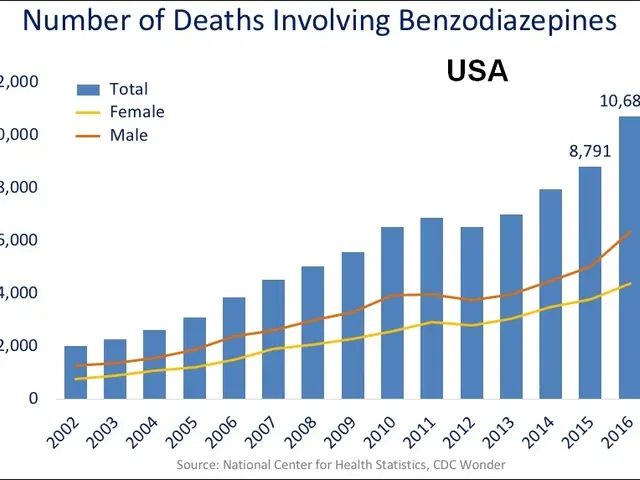Human Endurance: Duration without Food Intake
In times of extreme hardship, the human body can adapt to survive without food for extended periods. However, this comes with a host of health implications and risks.
Prolonged fasting, as a result, leads to malnutrition, causing symptoms such as anemia, weakened bones, and impaired immune function. The body lowers its basal metabolic rate (BMR) to conserve energy, reducing calorie expenditure by up to 25%.
During this period, cells break down damaged or unnecessary components through a process called autophagy, recycling nutrients and maintaining cellular function. This process helps the body to prolong survival, but it also leads to disruptions in brain function, causing memory loss, poor decision-making, and difficulty concentrating.
The depletion of energy and nutrients impairs the production of white blood cells, increasing susceptibility to infections. Severe malnutrition can lead to hallucinations, confusion, and disorientation, especially in the later stages of starvation.
It's important to note that survival without food is highly dependent on several critical factors. Hydration, for instance, is crucial. People can only survive about 3 to 7 days without water, so it's far more immediately critical than food.
Individuals with higher fat stores last longer since fat serves as the primary energy reserve during starvation. As fat depletes, the body metabolizes muscle tissue for energy, including vital tissues like heart muscle, typically starting 3 to 5 days into starvation.
Chronic diseases, compromised immune function, or infections accelerate deterioration and shorten survival time. Younger people with faster metabolisms use energy faster, potentially reducing survival time compared to older individuals.
Physical exertion increases energy expenditure, decreasing how long one can survive without food. Stress and emotional distress can also negatively affect physiological responses to starvation.
In end-of-life scenarios such as hospice care, reduced appetite and decreased food intake are natural processes as the body prepares for death.
In such dire circumstances, hormones like insulin, glucagon, and cortisol adjust to prioritize fat metabolism and glucose conservation. Starvation triggers anxiety, depression, and irritability as the brain struggles to maintain balance.
Starvation increases the risk of arrhythmias, hypotension, and heart failure due to electrolyte imbalances and muscle loss in the heart.
However, there are cases where individuals have survived prolonged fasting under medical supervision. Angus Barbieri, a Scottish man, famously fasted for 382 days under medical supervision, consuming only water, vitamins, and minerals. Medically supervised fasting ensures that individuals receive necessary vitamins, minerals, and hydration, minimizing risks while leveraging the potential benefits of fasting.
In regions plagued by poverty, conflict, and climate-related disasters, chronic food insecurity leads to widespread malnutrition, stunted growth, and preventable deaths. It's a stark reminder of the importance of access to food and proper nutrition for overall health and survival.
- Prolonged fasting can cause malnutrition, leading to symptoms such as anemia, weakened bones, and impaired immune function.
- Autophagy, a process through which cells break down damaged or unnecessary components during fasting, helps the body prolong survival but can disrupt brain function.
- Depletion of energy and nutrients impairs the production of white blood cells, making individuals more susceptible to infections.
- Severe malnutrition can lead to hallucinations, confusion, and disorientation in the later stages of starvation.
- Factors such as hydration, age, physical exertion, stress, and emotional distress affect survival time during starvation.
- While survival without food is challenging, there are cases where individuals have survived prolonged fasting under medical supervision, demonstrating the potential benefits of fasting when managed appropriately.




